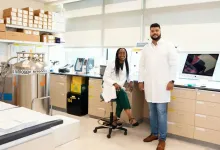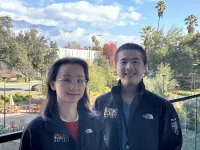(Press-News.org) About 55 million people worldwide are living with dementia, according to the World Health Organization. The most common form is Alzheimer’s disease, an incurable condition that causes brain function to deteriorate.
In addition to its physical effects, Alzheimer’s causes psychological, social and economic ramifications not only for the people living with the disease, but also for those who love and care for them. Because its symptoms worsen over time, it is important for both patients and their caregivers to prepare for the eventual need to increase the amount of support as the disease progresses.
To that end, researchers at The University of Texas at Arlington have created a novel learning-based framework that will help Alzheimer’s patients accurately pinpoint where they are within the disease-development spectrum. This will allow them to best predict the timing of the later stages, making it easier to plan for future care as the disease advances.
“For decades, a variety of predictive approaches have been proposed and evaluated in terms of the predictive capability for Alzheimer’s disease and its precursor, mild cognitive impairment,” said Dajiang Zhu, an associate professor in computer science and engineering at UTA. He is lead author on a new peer-reviewed paper published open access in Pharmacological Research. “Many of these earlier prediction tools overlooked the continuous nature of how Alzheimer’s disease develops and the transition stages of the disease.”
In work supported by more than $2 million in grants from the National Institutes of Health and the National Institute on Aging, Zhu’s Medical Imaging and Neuroscientific Discovery research lab and Li Wang, UTA associate professor in mathematics, developed a new learning-based embedding framework that codes the various stages of Alzheimer’s disease development in a process they call a “disease-embedding tree,” or DETree. Using this framework, the DETree can not only predict any of the five fine-grained clinical groups of Alzheimer’s disease development efficiently and accurately but can also provide more in-depth status information by projecting where within it the patient will be as the disease progresses.
To test their DETree framework, the researchers used data from 266 individuals with Alzheimer’s disease from the multicenter Alzheimer’s Disease Neuroimaging Initiative. The DETree strategy results were compared with other widely used methods for predicting Alzheimer’s disease progression, and the experiment was repeated several times using machine learning-methods to validate the technique.
“We know individuals living with Alzheimer’s disease often develop worsening symptoms at very different rates,” Zhu said. “We’re heartened that our new framework is more accurate than the other prediction models available, which we hope will help patients and their families better plan for the uncertainties of this complicated and devastating disease.”
He and his team believe that the DETree framework has the potential to help predict the progression of other diseases that have multiple clinical stages of development, such as Parkinson’s disease, Huntington’s disease, and Creutzfeldt-Jakob disease.
END
New tool helps predict progression of Alzheimer’s
UTA’s framework can pinpoint clinical status of individuals within the disease spectrum
2024-01-26
ELSE PRESS RELEASES FROM THIS DATE:
Political polarization may slow legislation, make higher-stakes laws likelier
2024-01-26
The United States House of Representatives held more than 700 votes in 2023, but fewer than 30 bills were signed into law. Partisan politics may explain why, with polarization potentially causing enough friction to slow down the legislative process and make the passage of fewer, farther-reaching public laws likelier, according to researchers.
The collaborators from Penn State and Colorado State University studied levels of polarization and patterns in the passage of budget bills and public laws from 1948 through ...
Common cold or COVID-19? Some T cells are ready to combat both
2024-01-26
Scientists at La Jolla Institute for Immunology (LJI) have found direct evidence that exposure to common cold coronaviruses can train T cells to fight SARS-CoV-2. In fact, prior exposure to a common cold coronavirus appears to partially protect mice from lung damage during a subsequent SARS-CoV-2 infection.
The new research, published recently in Nature Communications, provides an important first look at how "cross-reactive" T cells—which can fight multiple viruses from the same family—develop in an animal model. "We are learning how these immune cells develop ...
The science behind mindfulness: How one University of Ottawa professor embraced it for the benefit of her students
2024-01-26
Understanding the neuroscience and physiological basis of the brain and training its networks to combat anxiety and life’s stressors
Professor Andra Smith, from the School of Psychology at the Faculty of Social Sciences, has combined her research and her personal experience with mindfulness to teach the course Neuroscience of Mindfulness: Neurons to Wellness. Her interest in neuroscience explores how to optimize cognitive processes behind decision-making, organizing behaviour, setting goals while taking the necessary steps ...
UC Irvine-led team unravels mysteries of planet formation and evolution in distant solar system
2024-01-26
A recently discovered solar system with six confirmed exoplanets and a possible seventh is boosting astronomers’ knowledge of planet formation and evolution. Relying on a globe-spanning arsenal of observatories and instruments, a team led by researchers at the University of California, Irvine has compiled the most precise measurements yet of the exoplanets’ masses, orbital properties and atmospheric characteristics.
In a paper published today in The Astronomical Journal, the researchers share ...
Confirmation of ancient lake on Mars builds excitement for Perseverance rover's samples
2024-01-26
If life ever existed on Mars, the Perseverance rover’s verification of lake sediments at the base of the Jezero crater reinforces the hope that traces might be found in the crater.
In new research published in the journal Science Advances, a team led by UCLA and The University of Oslo shows that at some point, the crater filled with water, depositing layers of sediments on the crater floor. The lake subsequently shrank and sediments carried by the river that fed it formed an enormous delta. As the lake dissipated over time, the sediments in the crater were eroded, forming ...
USC Stem Cell study shows how gene activity modulates the amount of immune cell production in mice
2024-01-26
As people age or become ill, their immune systems can become exhausted and less capable of fighting off viruses such as the flu or COVID-19. In a new mouse study funded in part by the National Institutes of Health and published in Science Advances, researchers from the USC Stem Cell lab of Rong Lu describe how specific gene activity could potentially enhance immune cell production.
“Hematopoietic stem cells, or HSCs, produce blood and immune cells, but not all HSCs are equally productive,” said the study’s corresponding author Rong Lu, PhD, ...
How waves and mixing drive coastal upwelling systems
2024-01-26
They are among the most productive and biodiverse areas of the world's oceans: coastal upwelling regions along the eastern boundaries of the Atlantic and Pacific Oceans. There, equatorward winds cause near-surface water to move away from the coast. This brings cold, nutrient-rich water from the depths to the surface, inducing the growth of phytoplankton and providing the basis for a rich marine ecosystem in these regions.
In some tropical regions, however, productivity is high even when the upwelling favourable winds are ...
How a timekeeping gene affects tumor growth depends entirely on context
2024-01-26
JANUARY 23, 2024, NEW YORK – A Ludwig Cancer Research study has found that the circadian clock—which synchronizes physiological and cellular activities with the day-night cycle and is generally thought to be tumor suppressive—in fact has a contextually variable role in cancer.
“A lot of evidence suggests that the biological clock is broken in cancer cells, so we expected its disruption would fuel tumor growth in mouse models of melanoma,” said Chi Van Dang, scientific director of the Ludwig Institute for Cancer Research, who led the study with Research Associate Xue Zhang. “But, contrary to our expectations, ...
UT Extension Consumer Economics Specialist named National Educator of the Year for 2023
2024-01-26
An assistant professor and consumer economics specialist with University of Tennessee Extension has been recognized by the Association for Financial Counseling and Planning Education (AFCPE) as the organization’s Educator of the Year for 2023. Christopher Sneed was among ten individuals, organizations, special projects and initiatives expanding access to personal finance resources and education across the country recognized as part of the 2023 AFCPE Awards late last year.
The AFCPE’s Mary Ellen Edmondson Educator of the Year Award honors ...
Female reproductive milestones may be risk factors for diabetes and high cholesterol later in life
2024-01-26
Boston, MA – A new review of available evidence led by researchers at the Harvard Pilgrim Health Care Institute suggests that female reproductive characteristics may be overlooked as risk factors that contribute to later metabolic dysfunction.
The review, “Reproductive risk factors across the female lifecourse and later metabolic health,” was published in the January 26 edition of Cell Metabolism.
Metabolic health is characterized by optimal blood glucose, lipids, blood pressure, and body fat. Alterations in these characteristics may lead to the development of type 2 diabetes or cardiovascular disease.
“Our ...
LAST 30 PRESS RELEASES:
Why does chronic back pain make everyday sounds feel harsher? Brain imaging study points to a treatable cause
Video messaging effectiveness depends on quality of streaming experience, research shows
Introducing the “bloom” cycle, or why plants are not stupid
The Lancet Oncology: Breast cancer remains the most common cancer among women worldwide, with annual cases expected to reach over 3.5 million by 2050
Improve education and transitional support for autistic people to prevent death by suicide, say experts
GLP-1 drugs like Ozempic could cut risk of major heart complications after heart attack, study finds
Study finds Earth may have twice as many vertebrate species as previously thought
NYU Langone orthopedic surgeons present latest clinical findings and research at AAOS 2026
New journal highlights how artificial intelligence can help solve global environmental crises
Study identifies three diverging global AI pathways shaping the future of technology and governance
Machine learning advances non targeted detection of environmental pollutants
ACP advises all adults 75 or older get a protein subunit RSV vaccine
New study finds earliest evidence of big land predators hunting plant-eaters
Newer groundwater associated with higher risk of Parkinson’s disease
New study identifies growth hormone receptor as possible target to improve lung cancer treatment
Routine helps children adjust to school, but harsh parenting may undo benefits
IEEE honors Pitt’s Fang Peng with medal in power engineering
SwRI and the NPSS Consortium release new version of NPSS® software with improved functionality
Study identifies molecular cause of taste loss after COVID
Accounting for soil saturation enhances atmospheric river flood warnings
The research that got sick veterans treatment
Study finds that on-demand wage access boosts savings and financial engagement for low-wage workers
Antarctica has lost 10 times the size of Greater Los Angeles in ice over 30 years
Scared of spiders? The real horror story is a world without them
New study moves nanomedicine one step closer to better and safer drug delivery
Illinois team tests the costs, benefits of agrivoltaics across the Midwest
Highly stable self-rectifying memristor arrays: Enabling reliable neuromorphic computing via multi-state regulation
Composite superionic electrolytes for pressure-less solid-state batteries achieved by continuously perpendicularly aligned 2D pathways
Exploring why some people may prefer alcohol over other rewards
How expectations about artificial sweeteners may affect their taste
[Press-News.org] New tool helps predict progression of Alzheimer’sUTA’s framework can pinpoint clinical status of individuals within the disease spectrum








